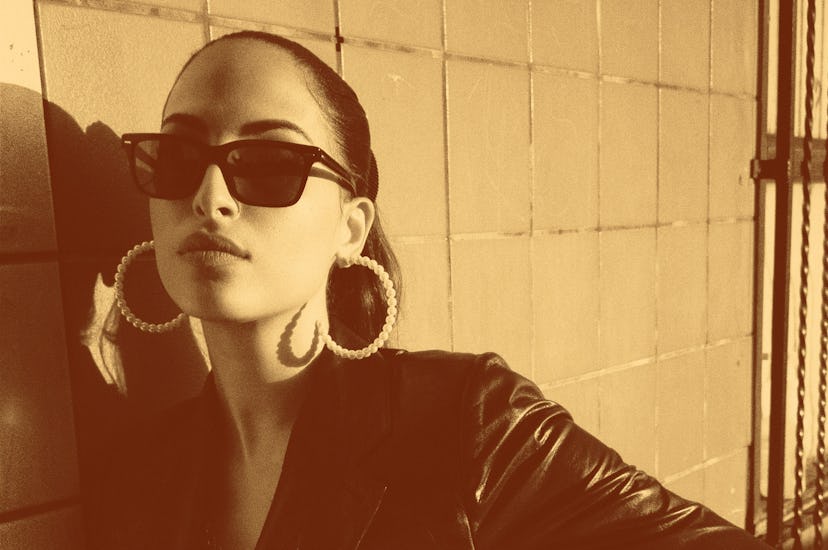New Faces: Snoh Aalegra Delves Deep with her Sophomore Album, -Ugh, those feels again

It’s often said that Virgos lack emotion, but for the Swedish-born singer Snoh Aalegra—who celebrates her 31st birthday today, squarely under the sixth sign—that couldn’t farther from the truth. “I feel so deeply, which is a gift and a curse,” she told me recently. And she doesn’t make any attempt to hide it. Aalegra’s sophomore album -Ugh, those feels again is the follow-up to her 2017 debut, FEELS. And on both she opens up about everything from the from the giddy excitement of new love to the agony of breakups. “The only thing I try to get across is my truth,” Aalegra said, explaining that she was in a relationship for the songwriting process of FEELS and, when it ended, she did her best to grow from the heartbreak. “A whole new chapter started for me,” she said. “-Ugh, those feels again touches on being a single woman, exploring different sides of myself, just maturing and being more open to new love and the positive feelings of that.”
Aalegra’s sound, which she describes as “cinematic soul,” is passionate and dramatic. She is hugely inspired by ’80s and ’90s R&B—Whitney Houston, Stevie Wonder, Prince, Sade, Brandy—and playfully refers to herself as the “result” of growing up watching MTV. But she also credits filmmakers like Steven Spielberg and Walt Disney for informing her sound. “I always paid attention to how you can build drama with music when you score something,” Aalegra said. “Big orchestras, arrangements…I kind of wanted to do that with my own music. I write only about my own life, it’s super personal. I’m kind of scoring my life, and I want it to feel almost like a movie when you’re listening to it.”
For Aalegra, everything is potential material. “You know, I’ll be in a relationship with someone and he says this one line and I’m like, ‘Hmm.’ I will pay attention and write it down,” she said. Her new song“Charleville 9200, Part II”, for example, was taken from her experience of falling madly in love and then watching it all fall apart. “It’s like a romantic comedy, basically. What happened [at the start of the relationship] was almost unreal in a way that was cheesy and felt like a movie so I had to write about it,” she said. “Then, when it ended, I had to go back and tie everything in together.”
Still, despite the breakup songs, Aalegra says she is trying to embrace the brighter side of life with her new album. “It’s more broad and open because I’ve been more open, generally, with my energy,” she said. “I was even more open to experimenting in the studio, trying new sounds, didn’t take everything so seriously, you know? I was willing to go to the studio and just have fun. I had more fun than ever making this album.”
As a child in Sweden—where she was born and raised—Aalegra was determined to be an artist, but she was never the most outgoing kid in her class. “I was always dancing around and always wanted to entertain around the house. In school.. I was kind of to myself,” she said. “I was bullied a lot, from third grade up until the end of high school, and it kind of shaped me into having low self esteem that I had to really work on in my adult years.”
Eventually, Aalegra relocated from Stockholm to Los Angeles to pursue her music career—a move that required some getting used to. “It was a shock how people are pretty loud in the U.S. You’re supposed to be loud and kind of braggadocious with an ‘I’m the shit’ kind of attitude. That’s not so common [in Sweden],” she laughed. “People are super humble and kind of quiet when they walk in a room. Coming to the States as an artist, label people would be like, ‘Why is she so quiet and shy? When she’s arriving, she needs to arrive.’ Stuff like that made me laugh a lot.”
Complicating matters is the fact that Aalegra is, as she puts it, a “double immigrant”: her parents came to Sweden from Iran before she was born. Often, she gets the question “Where are you from?” followed by the inevitable, “No, where are you really from?”
“It’s trippy to be born and raised in a country where you’re still looked at as if you’re not from there,” she said. “Sweden is a beautiful country. I’m so happy that I grew up there, but I also encountered some racism in school and even now, as an adult, walking down the street somebody will look at me and be like, ‘Go back to where you belong.’ For me it’s like, ‘I’m from here, what are you talking about?’ But to them, I’m not from here.”
Finding role models was also a struggle. “Recently I realized I never had anyone who looked like me to look up to; there aren’t many Middle Eastern women or artists at the forefront of pop culture,” she said. “Now more and more people are reaching out saying they look up to me for what I’m doing. It’s a great feeling and a lot of responsibility.”
These days, whether in Stockholm or LA, she’s finally feeling that sense of belonging that always evaded her.”It’s not nice to feel like you don’t know where your home is,” she said. “That’s been a thing for me— struggling, wondering where home is.” Now, she said, she’s “realized home is not a place, I’m at home on any stage that I’m on. That’s where I feel like I’m welcome, because people came there to see me and they want me there. That’s where I feel at home.”
Related: New Faces: Jay Som Hits Her Stride With Sophomore Album “Anak Ko”